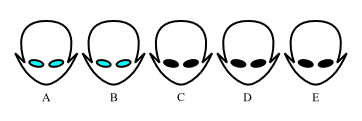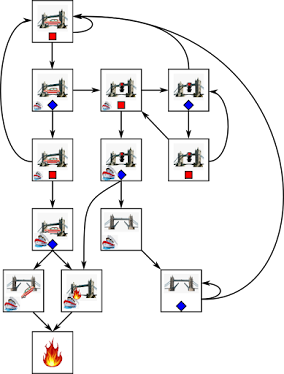On fiction: so you want to be a writer?
Apparently, the answer to that question is "yes" for many people. Certainly enough, to make the "help you become a writer" literature a viable genre in itself.
Well, I'm one of the people for which the answer is "yes", so I figured, why not check out some of the stuff that's out there, especially when it's freely available on youtube? Here's what I found so far.
Going to youtube produces any number of writing tutorials and channels dedicated to such, so you're bound to find something to your taste. The three I spent more time on are K. M. Weiland, Storymind and WriteAboutDragons.
Storymind is the crudest of the three in terms of presentation- fairly poor image and sound quality. Still, it's meant to advertise for some software designed, in part, by the channel owner, which results in occasionally deep (or so they seem to a novice like me) forays into story structure and theory. The videos are also fairly short and self-contained, which is a plus.
WriteAboutDragons contains the lectures on Creative Writing held by Brandon Sanderson, and covers topics from the craft of writing genre fiction (various aspects of character design, world building, plotting and so on) to the business of writing (networking, dealing with publishers, finding agents or going solo). These being lectures, they are the most rambly of the videos, but they're well worth your time if you can spare it. Pity the questions that the students ask aren't always intelligible though.
In terms of presentation, my favorite is K. M. Weiland's channel. Almost all videos are barely over two minutes long and designed to convey one point in a concise, precise manner. There's no room for uhms and ahs nor blank spaces as you'd find in a lecture, image and sound are fine, and her style is upbeat and easy to follow.
After all that, what lessons have I learned? I'd venture to say quite a few, but I'll stick with some general conclusions here. There's only two advices that someone who wants to be a writer needs to hear: "you need to write" and, more importantly even, "you need to read". A large part of the craft can be learned easier not by one's own trial and error, but by seeing the craft as done by others. It also helps to read what some magazine or publishing house is sending to print, if one desires to try to submit something there.
Another thing I learned was that, sadly, short stories seem almost dying as a form. Which is a pity because if I'm going to read something, it would likely be a short story or novella. Still, asked Sanderson of his students, how many of you are subscribed to short story magazines? I think they were two out of thirty. And I wouldn't have been among those two.
Meanwhile, in the little writing I do, I seem to veer towards shorter forms. I've written five or so short stories that I threw in a cupboard, basically. Now, I've got a "novella" going on at fanfiction.net. Only a "novella" apparently, at least as far as word count is concerned. I won't hit the 50k that's an arbitrary threshold for "novel". Yes, there's more to fiction classification than word count, but it's an easy proxy and even looking at some deeper indicators of novel vs. novella, in all honesty a novella is just what "Paradise Sought" will be.
So ok, I decided to embrace the idea of writing short fiction, even novellas, which Sanderson claims are very difficult to get published these days anywhere. Hey, not quitting my day job or anything, mostly doing this for a lark, so no risk in going over to duotrope and search for publishers of SF that will take novellas.
Found several interesting ones. And while it's a bit early for New-Year's Resolutions, let's make a few.
First, I'll make it a habit to regularly check Aphelion and Bewildering Stories. These are webzines and they offer no payment for publishing a story there. Which indicates to me that, probably, getting published there is easier than it would be in paying venues. Aka, these appear to be closer to amateur venues, though I also suspect somewhat more exclusive than fanfic. So the next step is to get one story published in each sometime next year.
Scareship is another amateur (I mean it in the best sense of the word) venue. Worth targeting, and it appears fairly new compared to the others.
Subscribing to Analog Science Fiction and Fact and Asimov's Science Fiction is also a must. I also see that these venues are very generous once they decide to publish an author, which indicates that they'll be very miserly with accepting submissions. Unlikely to make it into their pages too soon, but I'll nonetheless try to send something to one of them next year and see how that goes.
Fried Fiction is an e-zine where the starting author maybe has better chances, seeing as how they offer token payment. I'll definitely follow it and send something to them sometime next year. The Colored Lens is a similar venue, and similarly I'll be targeting it too.
There are others, but let's limit things to these so far. If I want to hit my targets I'll need to write at least six short stories and submit them to these zines. Heh, let's see how that will turn out.
Meanwhile, I've got a fanfic to finish and another one to start. Conversations are wonderful, inspiration may strike from anywhere.
Well, I'm one of the people for which the answer is "yes", so I figured, why not check out some of the stuff that's out there, especially when it's freely available on youtube? Here's what I found so far.
Going to youtube produces any number of writing tutorials and channels dedicated to such, so you're bound to find something to your taste. The three I spent more time on are K. M. Weiland, Storymind and WriteAboutDragons.
Storymind is the crudest of the three in terms of presentation- fairly poor image and sound quality. Still, it's meant to advertise for some software designed, in part, by the channel owner, which results in occasionally deep (or so they seem to a novice like me) forays into story structure and theory. The videos are also fairly short and self-contained, which is a plus.
WriteAboutDragons contains the lectures on Creative Writing held by Brandon Sanderson, and covers topics from the craft of writing genre fiction (various aspects of character design, world building, plotting and so on) to the business of writing (networking, dealing with publishers, finding agents or going solo). These being lectures, they are the most rambly of the videos, but they're well worth your time if you can spare it. Pity the questions that the students ask aren't always intelligible though.
In terms of presentation, my favorite is K. M. Weiland's channel. Almost all videos are barely over two minutes long and designed to convey one point in a concise, precise manner. There's no room for uhms and ahs nor blank spaces as you'd find in a lecture, image and sound are fine, and her style is upbeat and easy to follow.
After all that, what lessons have I learned? I'd venture to say quite a few, but I'll stick with some general conclusions here. There's only two advices that someone who wants to be a writer needs to hear: "you need to write" and, more importantly even, "you need to read". A large part of the craft can be learned easier not by one's own trial and error, but by seeing the craft as done by others. It also helps to read what some magazine or publishing house is sending to print, if one desires to try to submit something there.
Another thing I learned was that, sadly, short stories seem almost dying as a form. Which is a pity because if I'm going to read something, it would likely be a short story or novella. Still, asked Sanderson of his students, how many of you are subscribed to short story magazines? I think they were two out of thirty. And I wouldn't have been among those two.
Meanwhile, in the little writing I do, I seem to veer towards shorter forms. I've written five or so short stories that I threw in a cupboard, basically. Now, I've got a "novella" going on at fanfiction.net. Only a "novella" apparently, at least as far as word count is concerned. I won't hit the 50k that's an arbitrary threshold for "novel". Yes, there's more to fiction classification than word count, but it's an easy proxy and even looking at some deeper indicators of novel vs. novella, in all honesty a novella is just what "Paradise Sought" will be.
So ok, I decided to embrace the idea of writing short fiction, even novellas, which Sanderson claims are very difficult to get published these days anywhere. Hey, not quitting my day job or anything, mostly doing this for a lark, so no risk in going over to duotrope and search for publishers of SF that will take novellas.
Found several interesting ones. And while it's a bit early for New-Year's Resolutions, let's make a few.
First, I'll make it a habit to regularly check Aphelion and Bewildering Stories. These are webzines and they offer no payment for publishing a story there. Which indicates to me that, probably, getting published there is easier than it would be in paying venues. Aka, these appear to be closer to amateur venues, though I also suspect somewhat more exclusive than fanfic. So the next step is to get one story published in each sometime next year.
Scareship is another amateur (I mean it in the best sense of the word) venue. Worth targeting, and it appears fairly new compared to the others.
Subscribing to Analog Science Fiction and Fact and Asimov's Science Fiction is also a must. I also see that these venues are very generous once they decide to publish an author, which indicates that they'll be very miserly with accepting submissions. Unlikely to make it into their pages too soon, but I'll nonetheless try to send something to one of them next year and see how that goes.
Fried Fiction is an e-zine where the starting author maybe has better chances, seeing as how they offer token payment. I'll definitely follow it and send something to them sometime next year. The Colored Lens is a similar venue, and similarly I'll be targeting it too.
There are others, but let's limit things to these so far. If I want to hit my targets I'll need to write at least six short stories and submit them to these zines. Heh, let's see how that will turn out.
Meanwhile, I've got a fanfic to finish and another one to start. Conversations are wonderful, inspiration may strike from anywhere.


Comments
Post a Comment